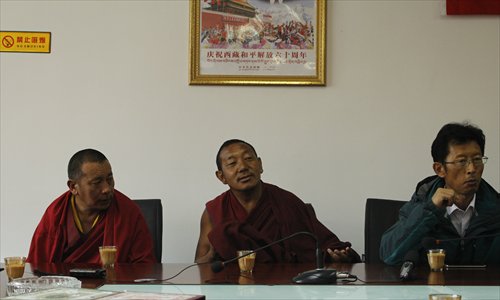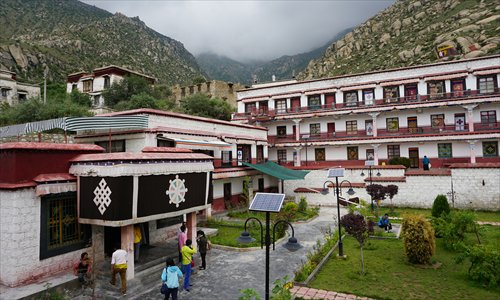Tibetan Buddhists receive education to dissuade them from separatism

Ngawang Chzin (center) sits with other management committee members at Drepung Monastery on August 5. Photo: Chen Heying/GT

A nursery home for elderly monks at Drepung Monastery in Lhasa. Photo: Chen Heying/GT
Several monks sat cross-legged, peacefully chanting sutras in a scripture hall in Drepung Monastery as if they weren't being watched by visitors. Observing this scene, it is hard for one to imagine that in this idyllic temple, some 300 monks charged at officials and policemen stationed in the monastery ahead of deadly riots seven years ago.
Unrest in Lhasa, capital of the Tibet Autonomous Region, in which a mob looted and burned stores on March 14, 2008, caused 19 deaths and 382 injuries.
The March 14 riots and earlier protests by monks are seen by Chinese authorities as a separatist plot orchestrated by the Dalai Lama clique in a bid to undermine the Beijing 2008 Olympic Games.
Drepung Monastery is one of three historic Buddhist monasteries in Lhasa. After the riots, the 15th-century monastery, an important site for the Gelug sect of Tibetan Buddhism, was closed to tourists for five months.
Since then, monasteries across the region have started a program of improving monk's living conditions and patriotic education, in which monks attend mandatory classes on Chinese law in an effort to further the government's management of the religious institutions.
Building relationships
Monasteries which are home to more than 20 monks and nuns are required to set up management committees, which are made up of monks and government-appointed officials. If there are more than 100 monks and nuns, a police substation will be placed in the monastery. The regional government has urged officials to treat monks and nuns like "citizens, family members and friends."
In Drepung Monastery, the committee consists of 13 officials and 12 monks, with an official as its head.
"At first, the monks distrusted us, seeing us as officials who merely serve the government," Norbu, head of the committee, told the Global Times.
"At first, they blocked our path to their rooms when we would visit them. Now they often chat with us casually while holding my hand," Norbu said, adding that the monks are now not reluctant to ask for favors, like helping them pay a phone bill or arrange some dental work.
A new road and an improved water and electricity supply have been installed at Drepung Monastery, in addition to a nursing home for elderly residents and a clinic. Now, all the monks have access to television, telephones and the Internet.
Six of the monastery's major buildings have been renovated with 70 million yuan ($11 million) of government funds, according to Norbu.
"We didn't know which government department we should ask for funds until the officials started working in the monastery," said Ngawang Chzin, a 49-year-old monk and deputy head of the committee.
By the end of 2014, over 1,750 monasteries had good access to roads and telecommunications networks, according to local government statistics.
Ngawang Chzin said that watching television, especially domestic news programs, can prevent monks from believing stories spread by separatists.
Learning the law
Hand in hand with improved services, patriotic education constitutes an essential part of government work at monastery. It was first launched as early as 1996 but was expanded after the 2008 riots.
Encouraging monks not to break any of the country's laws is a key part of these efforts, said Qin Yongzhang, a research fellow of Tibetology with the Chinese Academy of Social Sciences.
The sessions aim at developing monks' "national consciousness," "civic consciousness" and "legal consciousness," to dissuade them from holding separatist views, Norbu said.
In Drepung Monastery, monks are divided into 10 study groups that gather twice a week to discuss their studies. The monks are lectured on China's laws and regulations on regional ethnic autonomy and religion, as well as central political events like the meetings of the National People's Congress and the Chinese Political Consultative Conference, according to Norbu.
Sonam Chupa, head of the administration committee of Samye Monastery in Zha'nang county, Tibet's Shannan prefecture, added that the education curriculum includes stories about monks from history who advocated mainstream ideas of harmony and ethnic solidarity, such as founder of the Gelug sect Je Tsongkhapa (1357-1419) and the 10th Panchen Lama(1938-89).
Professors of Buddhist studies from Tibet University, eminent monks and officials stationed in monasteries have been invited to give lectures to monks.
"At first the monks, who believed the law had nothing to do with them, were reluctant to attend the lectures, skipping class or dozing during lectures," Norbu recalled.
Some monks felt puzzled by official opposition to the 14th Dalai Lama, as in Tibetan Buddhism believers are required to obediently follow the instructions of religious figures such as the Dalai Lama, who many of the monks see as a respectable teacher, said an expert on Buddhist studies who asked for anonymity.
"Monks who vilified Buddhist teachers in the reports they handed to officials were shunned by other monks for being unfaithful," he said.
However, most monks manage to reconcile religious discipline with the law that forbids separatism.
"Buddhist doctrines advocate the practice of charity and prohibit the infringement of personal rights, which are views consistent with the law," Lozang Khedrup, a monk and deputy head of the administration committee of Samye Monastery, told the Global Times through an official interpreter.
"As long as monks fully embrace these doctrines, they will be law-abiding," he said.
"Monks can evaluate the pros and cons of stirring up unrest, considering that Drepung's income, which is mainly composed of ticket sales and donations, plunged after certain monks in the monastery participated in the 2008 riots," Norbu explained.
Asked about their study of the law, monks admitted their obstacles to understanding them. Jigme Odser, a monk in Samye Monastery, said it is different from studying Buddhism. "We just memorize them. [Laws] are not like Buddhist scriptures that need to be debated to deepen our understanding."
Newspaper headline: Preaching patriotism